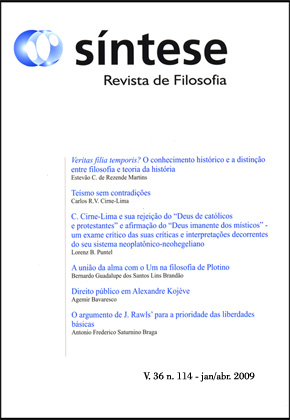O ARGUMENTO DE J. RAWLS PARA A PRIORIDADE DAS LIBERDADES BÁSICAS
DOI:
https://doi.org/10.20911/21769389v36n114p131-150/2009Palavras-chave:
Rawls, Utilitarismo, Posição Original, Racionalidade, Razoabilidade.Resumo
Este artigo analisa o argumento para a prioridade das liberdades básicas apresentado por J. Rawls em sua obra Liberalismo Político, em resposta à s críticas feitas por H. Hart ao argumento exposto em Uma Teoria da Justiça. Uma vez que as críticas de Hart apontam para a insuficiência da primeira obra de Rawls no confronto com argumentos de teor utilitarista, o artigo analisa o capítulo VIII de Liberalismo Político à luz do debate entre o deontologismo rawlsiano e a teoria utilitarista. A grande novidade que Rawls introduz em relação à sua primeira obra consiste na tese de que a prioridade das liberdades funda-se numa concepção de pessoa admitidamente liberal. Além de apresentar as dificuldades que esta concepção acarreta para Rawls, identifico e discuto uma possível saída para estas dificuldades.
Abstract: In this article I analyze the argument for the priority of the basic liberties presented by J. Rawls in Political Liberalism, responding to H. Hart's criticisms to his previous argument, presented in A Theory of Justice. Since Hart's criticisms point to the weakness of Rawls' first book in the face of utilitarian arguments, I analyze chapter VIII of Political Liberalism bearing in mind the debate between Rawls' deontological theory and the utilitarian theory. The great novelty introduced by Rawls concerning his first book is his claim that the priority of the liberties rests on a admittedly liberal conception of person. Besides presenting the difficulties that this conception entails, I identify and discuss a possible way out of them.


















